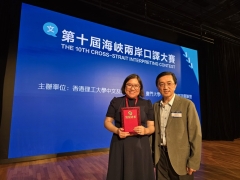Recent Graduate Wins First Prize at 10th Cross-Strait Interpreting Contest
| by Angela Izi Nkusi
Sijin Xian, who completed her master’s in conference interpretation this spring, won first prize in the prestigious contest organized by Hong Kong Polytechnic University.





